
Nuts have gone through a revival in recent years. They’re now seen as a source of healthy fats and a protein-packed snack, one that could even help you to lose weight (rather than as an unhealthy high-fat snack). But, what about the humble peanut? Are peanuts good for you or are they an exception?
After all, peanuts aren’t a tree nut at all. They’re actually a legume, which makes them closer to lentils and beans than to tree nuts – and doesn’t help their reputation.
In fact, peanuts are often seen as less healthy than tree nuts like almonds, walnuts, or Brazil nuts. Many people choose to skip peanuts altogether when they’re trying to improve health. Yet, peanuts have plenty of benefits too, so let’s take a close look at them.
Are Peanuts Good For You?
- Health Benefits Of Peanuts
- The Problems With Peanuts
- Can You Lose Weight With Peanuts?
- What About Peanut Butter?
- Final Thoughts
The Benefits Of Peanuts
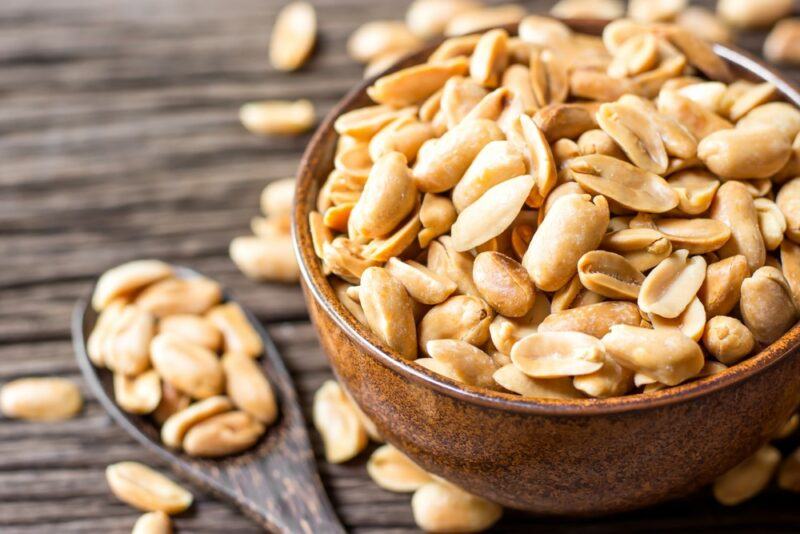
A Rich Source Of Protein
Peanuts provide a decent amount of protein in a small serving, often around 7 grams of protein per ounce. Plus, peanuts are convenient. You can simply grab a handful and eat them on the go. There’s nothing to prepare and nothing to worry about. What could be simpler?
Protein has plenty of benefits, like promoting muscle development and weight loss, while helping to keep you full between meals. Extra protein is especially important in some situations, like if you’re recovering from an illness or exercise hard.
The Fiber Content
You get plenty of fiber with peanuts too, a little over 2.5 grams per ounce. While this is less than almonds and some other tree nuts, it’s still a decent amount.
Fiber is critical. Even though our bodies don’t digest fiber, it helps our digestive systems to function well, while also promoting gut health, and reducing diabetes risk. It’s easy to end up with too little fiber in your diet. Peanuts are an easy way to boost your fiber intake.
Packed With Nutrients
Peanuts contain plenty of important nutrients too, including calcium, iron, potassium, and magnesium. They’re also a decent source of plant-based compounds, including antioxidants.
What’s more, you’re getting all these nutrients and phytonutrients in a convenient snack. As such, peanuts are a simple way to boost your nutrient intake.
You don’t need to eat peanuts on their own either. You can use peanuts in recipes too, like making a peanut satay sauce or including peanuts in a stew. If whole peanuts don’t work well in your recipe, try peanut butter instead.
Can Improve Your Heart Health
Don’t let the fat content of peanuts fool you – the legumes are good for your heart. Research shows that eating nuts regularly can lower the risk of heart disease.
Most studies on the topic have focused on nuts, including both peanuts and tree nuts. However, some have considered peanuts separately and have found that peanuts are as powerful as other types of nuts.
The effect isn’t too surprising, as much of the fat in peanuts is monounsaturated fat. This is the healthy type of fat, the one that’s been linked to many benefits.
Relatively Low In Carbs
Peanuts aren’t the best option if you’re on a low carb diet. Pecans, Brazil nuts, and macadamia nuts all contains fewer carbs per serving.
Still, the carb content isn’t too bad. You get roughly 8 net grams of carbs in a 3.5-ounce serving of peanuts. That’s not too bad, especially as your serving size might be much smaller.
The carb content is low enough that you can include peanuts on a keto diet. There are even plenty of recipes for keto peanut butter smoothies and keto peanut butter fat bombs.
Peanuts Are A Low Water Crop
Here’s another cool thing about peanuts – they don’t require much water. Tree nuts are actually some of the most water-intensive crops that we produce, with almonds and pistachios being the worst culprits.
This is becoming a serious problem, as demand for nuts is high and most are grown in California, which already seriously struggles with water. Because peanuts use much less water than all other tree nuts, they’re an environmentally-friendly choice.
The Problems With Peanuts
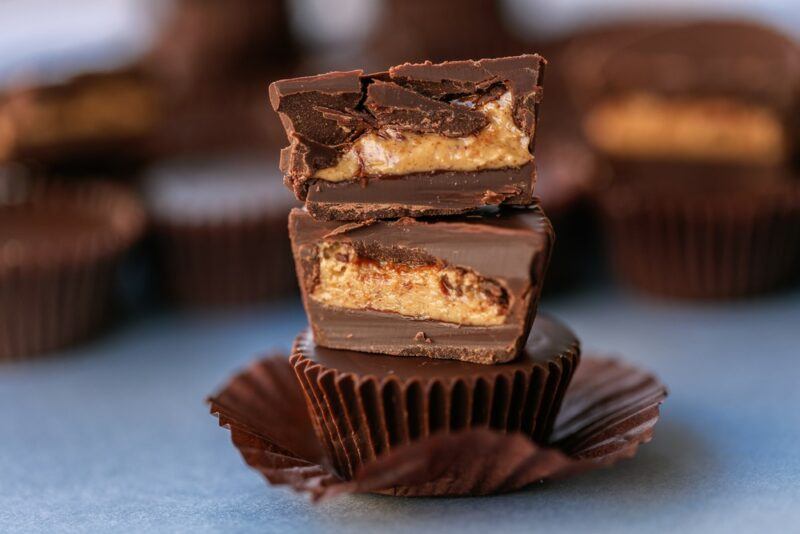
The Calorie Content
Just like tree nuts, peanuts are calorie dense. This means that you get a lot of calories in a small serving. For example, an ounce of roasted salted peanuts contains around 166 calories.
That serving size gives you roughly 35 peanuts, which sounds like a lot, but most of us eat many more than that when we have an open bag of nuts next to us. Rather than trying to exercise willpower and stop, why not portion your peanuts out ahead of time? This way there’s little temptation.
Be careful with salted peanuts too. It’s hard to stop with salty foods, as the more we eat, the more we crave. Many of us are already consuming more sodium than we should and peanuts just make that issue worse.
Peanuts Are Legumes
For some people, peanuts should be avoided because they’re legumes. This is why you don’t see peanuts on the paleo diet.
Part of the problem is that legumes have antinutrients, including lectins and phytic acid. These compounds can influence your ability to absorb nutrients from your food.
Research has shown that peanuts contain lectins and that these make their way into our bloodstream. However, studies haven’t shown whether the lectins from peanuts have any effect on human health. They might or they might not.
The best option might be to approach peanuts with caution. You might eat them sometimes and rely on other nuts as well. While tree nuts do contain some of the same antinutrients, including lectin, there are fewer concerning compounds.
There’s Less Evidence For Benefits
There’s been plenty of research into the benefits of nuts, including links to weight loss, decreased inflammation, and improved heart health. While many of these studies have included peanuts as well as tree nuts, fewer studies have looked at peanuts specifically.
As such, there’s still a lot we don’t know about peanuts.
This is another reason for varying the type of nuts that you eat. Besides, each type of nuts has its own balance of nutrients and plant-based compounds, so a wide selection gives you the most change for benefits.
The Salt
Peanuts are often sold salted, which makes it even easier to eat more peanuts than you intend. The salt is also concerning for health, as there are many other sodium rich foods. Many of us get too much sodium, which can cause harm.
You’ll get more benefits by focusing on unsalted nuts, ideally ones that haven’t been processed much.
Allergies
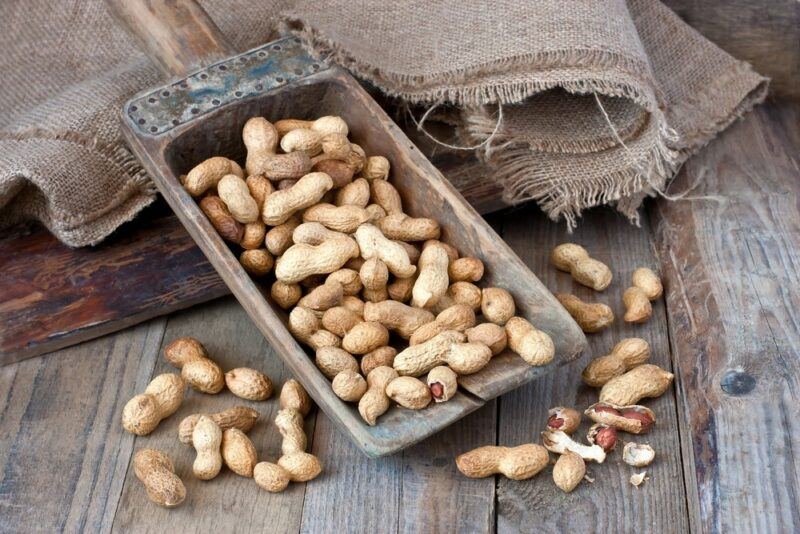
While you can be allergic to almost any food, peanut allergies are more common than most others. Somewhere between 4% and 8% of children have this allergy, along with 1% to 2% of adults.
Peanut allergies are significant for another reason too – they’re severe. It only takes trace amounts of peanuts to cause an allergic reaction and such reactions can be life-threatening.
Interestingly, a peanut allergy doesn’t seem to increase the chance of being allergic to most other legumes – but peanut allergies and tree nut allergies do seem to be related. Many people who are allergic to peanuts are also allergic to some tree notes, and vice versa.
There Are Side Effects
Some people get side effects from eating nuts, including peanuts. This can include gas and bloating from the tannins and phytates present in the nuts. If you have a large amount, the nuts may be difficult to digest too.
The fat content is another issue. High fat foods can cause diarrhea and make you feel sick, even if the fats are all healthy ones. This is another reason to be careful with your portion size. And, if you’re just getting started with peanuts – begin slowly. This gives your body time to adjust to the fat content.
Aflatoxin Poisoning
Peanuts can sometimes become contaminated with aflatoxin, which is a type of mold. Aflatoxin poisoning affects the liver, leading to symptoms like jaundice and loss of appetite. Severe cases can even contribute to severe liver problems, like cancer and liver failure.
Thankfully, you can decrease your risk by focusing on commercial brands and discarding any nuts that appear to be moldy or discolored. Serious issues are rare in the United States, as companies carefully inspect their products to avoid aflatoxin poisoning. This keeps your risk of exposure very low indeed.
Can You Lose Weight With Peanuts?
Peanuts hardly sound like the perfect weight loss food, as they’re high in fat and calories. Despite this, peanuts could help you lose weight.
There are multiple reasons for this effect. One is the fat, fiber, and protein content. This combination of macronutrients can help you feel full for longer.
Filling foods like peanuts can be helpful, as they decrease your cravings for other foods. The effect is ideal if you’re looking for something to keep you going before meals.
The caveat here is the calories in peanuts. To lose weight, you need to burn more calories than you take in. Doing so with peanuts involves carefully watching your portion size. After all, peanuts are calorie-dense, so it’s easy to eat too many and end up gaining weight instead of losing it.
What About Peanut Butter?
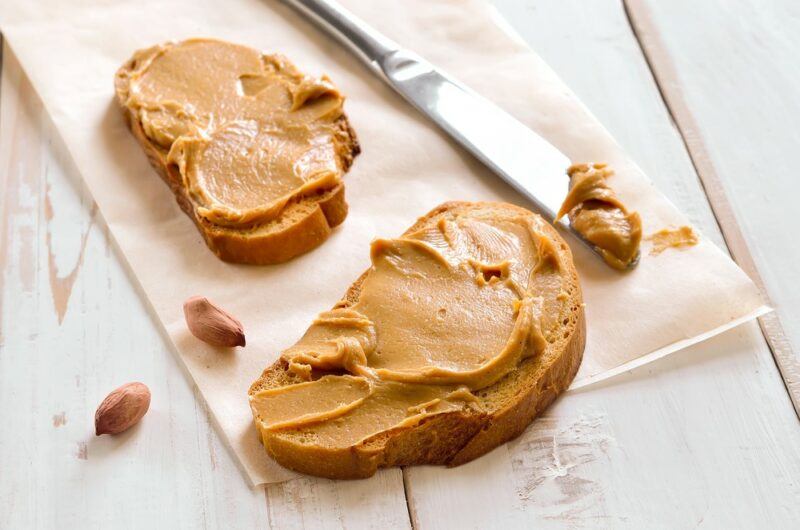
If you choose a good brand, then peanut butter can be healthy too. The trick is to find products that are made from peanuts, perhaps some salt, and nothing else.
While some companies do this, many others don’t. Poor quality products may use additives to tweak the flavor or texture of the peanut butter, while some also add sugar, which doesn’t help matters.
Don’t forget that peanut butter is calorie-dense just like peanuts themselves. It’s easy to eat more than you intend to, especially if you’re eating it straight from the jar.
Final Thoughts
While peanuts are legumes, they share many of the benefits as tree nuts, including their protein and fiber content, their nutrients, and how they can lower heart disease risk. Peanuts are also less expensive than tree nuts, which is a serious advantage, especially if you’re cash-strapped.
Of course, peanuts can set off serious allergic reactions, so you’ll need to be careful. If you are allergic or think that you might be, then you need to avoid peanuts entirely, as even trace amounts can be enough to trigger the reaction.
Frequently Asked Questions
Are Peanuts Keto Friendly?
This is a surprisingly controversial question. On one hand, peanuts are somewhere in the middle for carbs, giving you 8 grams of carbs per 100 grams of peanuts. This is similar to the number of carbs in almonds and walnuts.
This carb content suggests you need to be cautious with portion sizes. But, you shouldn’t need to cut peanuts out entirely.
There’s a second part to the discussion, though – the fact that peanuts are classified as legumes rather than tree nuts. Many keto dieters avoid legumes due to their antinutrient content, which might include cutting out peanuts.
Ultimately, it’s a personal decision. If you keep within your macro targets, peanuts shouldn’t kick you out of ketosis at all. They might even be helpful, as they’re typically cheaper than other types of nuts.
Are Peanuts Inflammatory?
Most evidence suggests that no, peanuts aren’t likely to promote inflammation. Some compounds in them, including polyphenols in peanut skins, may even decrease inflammation instead.
That said, there are concerns about aflatoxins on peanuts. These compounds could cause inflammatory reactions. To minimize your risk, try focusing on peanuts from large companies, as they should regularly be testing their nuts for aflatoxin.
Are Peanuts Good For Weight Loss?
Nuts are an interesting case for weight loss. They seem like a bad option due to their high calorie content.
However, nuts (including peanuts) are also very satiating. This means that even a small serving will keep you satisfied. Satiating snacks like nuts are powerful for weight loss, as they stop you from snacking on high calorie junk food.
However, the calorie density of peanuts means that care is needed. You’ll need to watch your operation sizes to make sure you don’t consume more calories than you intend to.
Are Peanuts High In Fiber?
Peanuts are a surprisingly decent source of fiber, giving you around 2.4 grams of fiber in an ounce. You’ll get even more fiber if you consume skin-on peanuts
There are plenty of better foods for fiber, like chia seeds, which give you 10 grams of fiber per ounce, but the fiber from peanuts still helps you hit your daily targets.
Are Peanuts Low FODMAP?
Despite being a type of legume, peanuts actually fit well onto a low FODMAP diet (the same is true for most other nuts too, except for pistachios). For peanuts, the low FODMAP serving is up to 32 peanuts, which is plenty.
You’ll still need to be careful with roasted seasoned peanuts though, as these sometimes use unexpected additives.


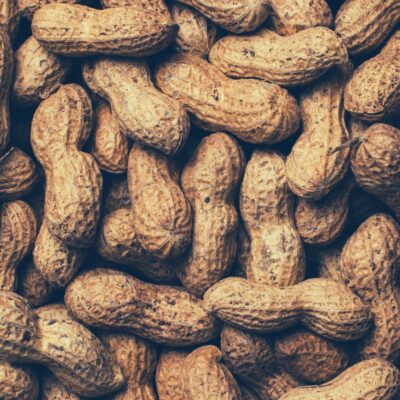
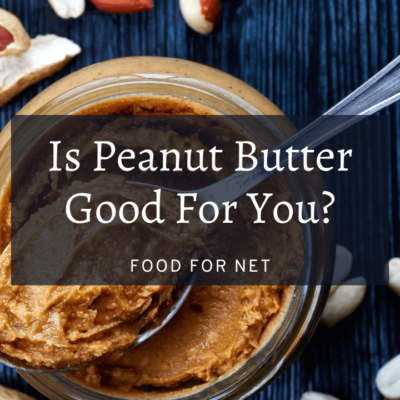
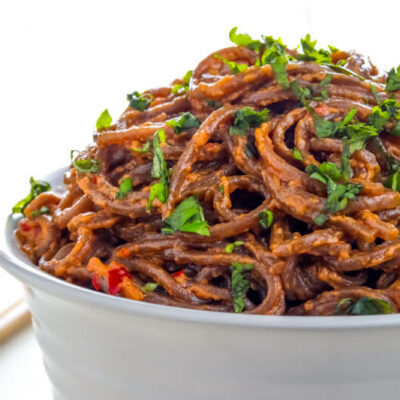

 15 Best Foods For Microbiome Health, Plus Three Easy Ways To Build A Better Microbiome
15 Best Foods For Microbiome Health, Plus Three Easy Ways To Build A Better Microbiome
Leave a Reply